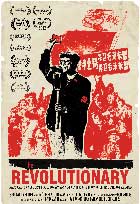
The Revolutionary 2011
Distributed by Stourwater Pictures, 11431 Miller Road NE, Bainbridge Island, WA 98110; 206-617-1354
Produced by Irv Drasnin, Lucy Ostrander & Don Sellers
Director n/a
DVD, color, 92 min.
Sr. High - General Adult
China, 20th Century History, Asian Studies, Political Science
Date Entered: 10/25/2012
Reviewed by Sheila Intner, Professor Emerita, Graduate School of Library & Information Science, Simmons College GSLIS at Mt. Holyoke, South Hadley, MAThe old saying goes, “Be careful what you wish for… you might get it.” This sage advice was lost on Sidney Rittenberg, a privileged American Jew from Charleston, South Carolina, who chose to dedicate nearly all his life to Chairman Mao and Chinese democracy.
Born in 1921, Mr. Rittenberg attended the University of North Carolina. He was drafted into the U.S. Army after the start of World War II, and was sent to the Army’s Language School at Stanford, where he learned Chinese. Posted to China as an American military liaison, he fell in love with the country. When the war ended, Mr. Rittenberg was invited to remain in China, which he very much wanted to do. He had long been an activist for democracy and civil rights at home in the U.S. and he wanted to be part of what he viewed as an historical shift in China’s politics, opposing the corrupt regime of Chiang Kai Shek and backing Mao Tse Tung. He agreed to stay in China if the rebel leadership allowed him to join the Communist Party. They did.
Through beautifully captured snippets of interviews with Mr. Rittenberg—the lion’s share of the film—as well as an excellent narration, brief archival clips, agreeable musical accompaniment, and dramatic visuals of Chinese Communist art, Sidney Rittenberg tells about his participation at Mao’s side in the birth of the People’s Republic of China. Not long afterward, accused of being a spy, he serves a 6-year term in solitary confinement in jail, but he never loses his faith in Mao or his vision of Chinese democracy.
A specialist in English-language radio broadcasting, he eventually becomes head of the Broadcast Administration, assuming a crucial role in the Communist leadership. He marries a colleague and they raise a family. Then comes the onset of the Cultural Revolution. Mr. Rittenberg is again jailed as a spy, this time spending almost a decade in solitary confinement. Once again, he is released, after Chairman Mao dies and the Gang of Four are jailed.
In 1980, he returns with his wife to the United States, a sadder but wiser man who now recognizes the flaws in Chairman Mao’s visionary experiments—the 100 Flowers Campaign, the Great Leap Forward, and the Cultural Revolution—and the devastating effects they had on the Chinese people. He admits guilt in misinterpreting the people and the politics in which he put his faith, yet he still believes in the dream that motivated his choices. He saw that power corrupts.
Technically, the film is outstanding. Without doubt, this is a splendid way to learn modern Chinese history and can enrich every study of 20th century China and Chinese Communism.
Highly recommended.
Awards:
- CINE Golden Eagle
- Audience Choice Award, Gig Harbor Film Festival